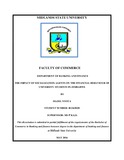Please use this identifier to cite or link to this item:
https://cris.library.msu.ac.zw//handle/11408/2222| Title: | An investigation on the relationship between savings motives and savings habits in Zimbabwe post dollarisation. | Authors: | Rupanga, Tulani | Keywords: | Savings motives Savings habits Zimbabwe post dollarisation. |
Issue Date: | Nov-2015 | Publisher: | Midlands State University | Abstract: | The main objective of the study was to bring knowledge to economic planners and policy makers on household savings behaviour with the motive to assist them in crafting policies accordingly which can be implemented to revive the poor savings culture obtaining in Zimbabwe. To achieve this objective the researcher investigated the relationship that exists between savings motives and savings habits in Zimbabwe post dollarisation. The major motivation of the study was the poor savings culture which has crippled down Zimbabwe’s economy as evidenced by the transitory nature of deposits with banks.Monetary authorities introduced the Multiple Currency System (MCS) in 2009 so as to restore price stability and restore financial intermediation but the MCS failed to attract savings back into the financial system. The research used a blend of the explanatory and exploratory research designs to carry out the study. The stratified random sampling technique was used to select 154 questionnaire respondents from the public in Gweru and Harare. The research relied on both primary data from the questionnaires and secondary data from the FinScope Consumer Survey of Zimbabwe 2014. The data was analysed using MS Excel and Stata 13 statistical package. The main findings from the 131 questionnaire respondents revealed that 39.69% of the research population saves formally and the remaining 60.31% do not formally save. A significant proportion of those who formally save, 94.23% saved monthly while the remaining 5.77% saved fortnightly. The research also revealed that Katona’s six general savings motives are strong predictors of savings habits in Zimbabwe. The necessities saving motive proved to be the most significant savings motive followed by the emergency savings motive, retirement savings motive, retirement savings motive, and lastly the children savings motive. The research results also revealed that the holiday savings motive was insignificant in explaining savings habits in Zimbabwe post dollarisation. For the regression analysis, the researcher included household income, gender, marital status, level of education and number of dependents as control variable in the regression model. The study mainly recommended financial industry players to educate the public on the importance of formally saving. The research also recommended that young children should be educated at very young ages so that they develop savings habits early in their life. | URI: | http://hdl.handle.net/11408/2222 |
| Appears in Collections: | Bachelor Of Commerce Banking And Finance Honours Degree |
Show full item record
Page view(s)
210
checked on Feb 13, 2026
Download(s)
180
checked on Feb 13, 2026
Google ScholarTM
Check
Items in MSUIR are protected by copyright, with all rights reserved, unless otherwise indicated.




